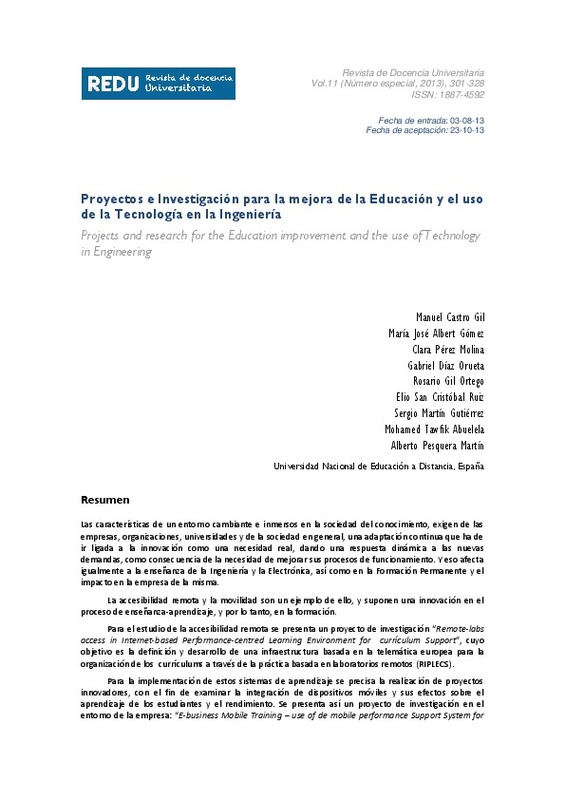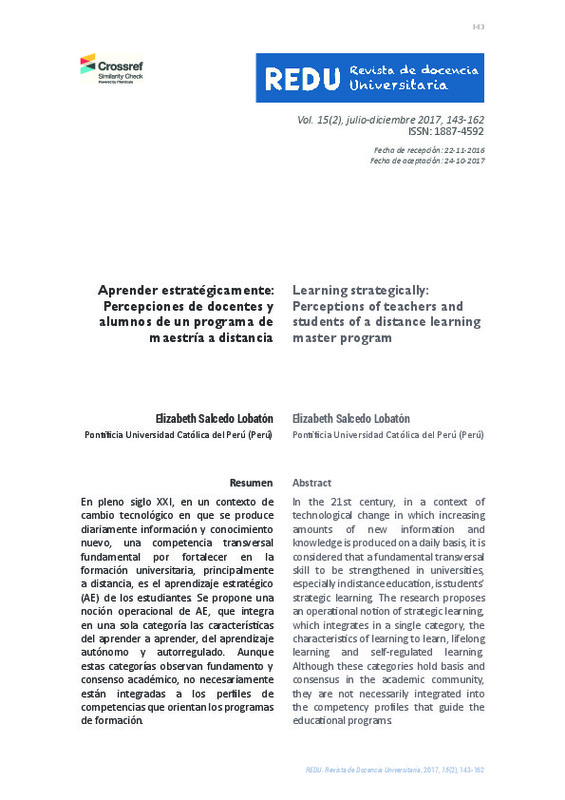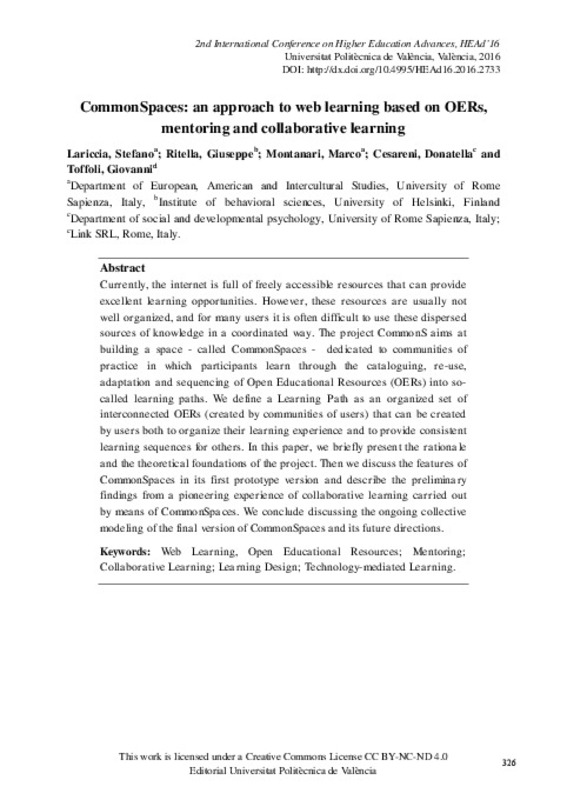JavaScript is disabled for your browser. Some features of this site may not work without it.
Buscar en RiuNet
Listar
Mi cuenta
Estadísticas
Ayuda RiuNet
Admin. UPV
Proyectos e Investigación para la mejora de la Educación y el uso de la Tecnología en la Ingeniería
Mostrar el registro sencillo del ítem
Ficheros en el ítem
| dc.contributor.author | Castro Gil, Manuel
|
es_ES |
| dc.contributor.author | Albert Gómez, María José
|
es_ES |
| dc.contributor.author | Pérez Molina, Clara
|
es_ES |
| dc.contributor.author | Díaz Orueta, Gabriel
|
es_ES |
| dc.contributor.author | Gil Ortego, Rosario
|
es_ES |
| dc.contributor.author | San Cristóbal Ruiz, Elio
|
es_ES |
| dc.contributor.author | Martín Gutiérrez, Sergio
|
es_ES |
| dc.contributor.author | Tawfik Abuelela, Mohamed
|
es_ES |
| dc.contributor.author | Pesquera Martín, Alberto
|
es_ES |
| dc.date.accessioned | 2020-04-14T12:31:55Z | |
| dc.date.available | 2020-04-14T12:31:55Z | |
| dc.date.issued | 2013-11-01 | |
| dc.identifier.issn | 1887-4592 | |
| dc.identifier.uri | http://hdl.handle.net/10251/140701 | |
| dc.description.abstract | [ES] Las características de un entorno cambiante e inmersos en la sociedad del conocimiento, exigen de las empresas, organizaciones, universidades y de la sociedad en general, una adaptación continua que ha de ir ligada a la innovación como una necesidad real, dando una respuesta dinámica a las nuevas demandas, como consecuencia de la necesidad de mejorar sus procesos de funcionamiento. Y eso afecta igualmente a la enseñanza de la Ingeniería y la Electrónica, así como en la Formación Permanente y el impacto en la empresa de la misma. La accesibilidad remota y la movilidad son un ejemplo de ello, y suponen una innovación en el proceso de enseñanza-aprendizaje, y por lo tanto, en la formación. Para el estudio de la accesibilidad remota se presenta un proyecto de investigación “Remote-labs access in Internet-based Performance-centred Learning Environment for currículum Support”, cuyo objetivo es la definición y desarrollo de una infraestructura basada en la telemática europea para la organización de los currículums a través de la práctica basada en laboratorios remotos (RIPLECS). Para la implementación de estos sistemas de aprendizaje se precisa la realización de proyectos innovadores, con el fin de examinar la integración de dispositivos móviles y sus efectos sobre el aprendizaje de los estudiantes y el rendimiento. Se presenta así un proyecto de investigación en el entorno de la empresa: “E-business Mobile Training –use of de mobile performance Support System for acquiring e-business Mangement Skills (EMTM)”Los programas curriculares deben conectarse con el mundo real del trabajo, detectando las habilidades que serán necesarias para el trabajo del futuro. En esta línea se presenta por último un proyecto innovador, “Performance-centred Adaptative Aurriculum for Employment Needs (PAC)”. Estos tres proyectos son una aportación práctica de la tecnología al mundo del aprendizaje y la formación, encarando los retos educativos europeos del siglo XXI, mediante tecnologías emergentes innovadoras aplicadas al aprendizaje. Palabras clave:e-learning, m-learning, b-learning, formación personalizada, formación en el puesto de trabajo, educación online y a distancia. | es_ES |
| dc.description.abstract | [EN] The characteristics of a changing environment and immersed in the knowledge society, demand from enterprises, organizations, universities and society in general, continuous adaptation. This adaptation has to be linked to innovation as a real need, giving a dynamic response to new demands, as a result of the need to improve their operation processes. And that also affects the teaching of Engineering and Electronics, as well as Lifelong learning and the impact on the company itself.Remote accessibility and mobility are an example ofthis, and represent an innovation in the teaching-learning process, and therefore, in training.The research project “Remote-labs access in Internet-based Performance-centred Learning Environment for currículum Support” is presented for the remote accessibility study. Whose objective is the definition and development of an infrastructure based on European telematics for the organization of currículum through practice based on remote laboratories (RIPLECS).The execution of innovative projects is required for the implementation of these learning systems, in order to examine the integration of mobile devices and their effects on student learning and capacity. A research project in the business environment is presented: “E-business Mobile Training –use of de mobile performance Support System for acquiring e-business Mangement Skills (EMTM)”Curricular programs should connect to the real world of work, identifying the skills that will be needed for future work. Finally, in this line is presented an innovative project, “Performance-centred Adaptative Aurriculum for Employment Needs (PAC)”. These three projects are a practical contribution of technology to the world of learning and training, facing the 21st century European educational challenges, by innovative emerging technologies applied to learning. | es_ES |
| dc.language | Español | es_ES |
| dc.publisher | Universitat Politècnica de València | es_ES |
| dc.relation.ispartof | REDU. Revista de Docencia Universitaria | es_ES |
| dc.rights | Reconocimiento - No comercial - Sin obra derivada (by-nc-nd) | es_ES |
| dc.subject | E-learning | es_ES |
| dc.subject | M-learning | es_ES |
| dc.subject | B-learning | es_ES |
| dc.subject | Blended learning | es_ES |
| dc.subject | E-learning in the workplace | es_ES |
| dc.subject | Online and distance education | es_ES |
| dc.subject | Formación personalizada | es_ES |
| dc.subject | Formación en el puesto de trabajo | es_ES |
| dc.subject | Educación online y a distancia | es_ES |
| dc.title | Proyectos e Investigación para la mejora de la Educación y el uso de la Tecnología en la Ingeniería | es_ES |
| dc.title.alternative | Projects and research for the Education improvement and the use of Technology in Engineering | es_ES |
| dc.type | Artículo | es_ES |
| dc.identifier.doi | 10.4995/redu.2013.5558 | |
| dc.rights.accessRights | Abierto | es_ES |
| dc.description.bibliographicCitation | Castro Gil, M.; Albert Gómez, MJ.; Pérez Molina, C.; Díaz Orueta, G.; Gil Ortego, R.; San Cristóbal Ruiz, E.; Martín Gutiérrez, S.... (2013). Proyectos e Investigación para la mejora de la Educación y el uso de la Tecnología en la Ingeniería. REDU. Revista de Docencia Universitaria. 11(0):301-328. https://doi.org/10.4995/redu.2013.5558 | es_ES |
| dc.description.accrualMethod | OJS | es_ES |
| dc.relation.publisherversion | https://doi.org/10.4995/redu.2013.5558 | es_ES |
| dc.description.upvformatpinicio | 301 | es_ES |
| dc.description.upvformatpfin | 328 | es_ES |
| dc.type.version | info:eu-repo/semantics/publishedVersion | es_ES |
| dc.description.volume | 11 | es_ES |
| dc.description.issue | 0 | es_ES |
| dc.identifier.eissn | 1887-4592 | |
| dc.relation.pasarela | OJS\5558 | es_ES |
| dc.description.references | Albert, M. J. (2005). Formación y empleo. Desarrollo y evolución profesional. Madrid, España, UNED. | es_ES |
| dc.description.references | Albert, M. J. y otros (2012). Performance-Centered Adaptive currículum for Employment Needs. Proc. del congreso Tecnologías Aplicadas a la Enseñanza de la Electrónica (TAEE), Junio de 2012, Vigo, España. | es_ES |
| dc.description.references | Armengol, C. y Rodríguez, D. (2006). La moderación de redes, algunos aspectos a considerar. Educar, 37, 85-100. | es_ES |
| dc.description.references | Garin, J. (2010). Nuevas estrategias formativas para las organizaciones. Bilbao. Wolters Kluwer, S.A. | es_ES |
| dc.description.references | Garin, J. y Armengol, C. (2003). Estrategias de formación para el cambio organizacional. Barcelona. Praxis. | es_ES |
| dc.description.references | Gil, R. (2010). Autenticación por Huella Dactilar en Sistemas de Gestión de Aprendizaje y su Análisis Empírico en Estudiantes de Ingeniería (Tesis Doctoral), UNED. | es_ES |
| dc.description.references | Gil, R., Castro, M. y otros. (2011). Sistema de verificación por huella dactilar en exámenes en Moodle. Proc. del Congreso FINTDI 2011 (Fomento e Innovación con Nuevas Tecnologías en la Docencia de la Ingeniería). Mayo de 2011, Teruel, España. | es_ES |
| dc.description.references | Gros S. (2012). La generación digital. Dentro de Nuevos medios para nuevas formas de aprendizaje. Reddigital.cnice.mec.es/3/firmas_nuevas/gros/gros_2.html. Consultado el 15 de Julio de 2012. | es_ES |
| dc.description.references | Martin S. y otros, (2011). State of the art of frameworks and middleware for facilitating mobile and ubiquitous learning development, Journal of Systems and Software, Volumen 84, Número 11, Noviembre de 2011, Páginas 1883-1891, ISSN 0164- 1212, 10.1016/j.jss.2011.06.042. | es_ES |
| dc.description.references | Martín, S. (2010). M2LEARN: Framework for Development of Mobile and Ubiquitous Learning Applications (Tesis Doctoral), UNED. | es_ES |
| dc.description.references | Martínez-Mediano, C. y otros (2010). Internet-based performance-centered learning environment for currículum Support (IPLECS) and its application in mLearning. Proc. del congreso Educon 2010, Abril de 2010, Madrid, España. | es_ES |
| dc.description.references | Pgdan, Y. (2009). Towards a theoretical model of dispositional influences on transfer of learning. Proc. del 10th International Conference on Human Resource Development: Research & Practice across Europe, Junio de 2009, Newcastle Business School, UK. | es_ES |
| dc.description.references | Plaza, I.; Martín, L.; Martin, S. y Medrano, C. (2011). Mobile applications in an aging society: Status and trends. Journal of Systems and Software. Volumen 84, Número 11, Noviembre de 2011, Páginas 1977-1988. | es_ES |
| dc.description.references | Salomon, G. (2000). It's not just the tools, but the educational rationale that counts. Presentación invitada en el congreso Ed-Media 2000, Montreal, [Online] http://construc.haifa.ac.it/~gsalomon/edMedia2000.html. Consultado el 15 de Julio de 2012. | es_ES |
| dc.description.references | San Cristóbal, E. (2010). Metodología, estructura y desarrollo de interfaces intermedias para la conexión de laboratorios remotos y virtuales a plataformas educativas (Tesis Doctoral), UNED. | es_ES |
| dc.description.references | Tauste, M.; Martín, S.; Sancrsitobal, E. Tawfik M.; Peire, J. y Castro, M. (2011). Implementation of a remote laboratory for practices in FPGAs Programmable Logic Devices. Proc. del congreso exp.at'11 - Remote and Virtual Labs, Noviembre de 2011, Lisboa, Portugal. | es_ES |
| dc.description.references | Tawfik M.; Sancristobal E.; Martín S; Gil R. y otros (2012). VISIR: Experiences and Challenges. iJOE - Volume 8, Issue 1, Febrero de 2012. | es_ES |
| dc.description.references | Tawfik, M. y otros. (2011) Chapter Title: Towards a Better Deployment of Remote Laboratories in Undergraduate Engineering Education, Editor: J. G. Zubía and G. R. Alves, Book Title: Using Remote Labs in Education: Two Little Ducks in Remote Experimentation, Bilbao, Publisher: University of Deusto, ISBN: 978-84-9830-398- 8, http://www.deusto-publicaciones.es/index.php/main/libro/913. | es_ES |
| dc.description.references | Yuren, M.T. (2004). ¿La autoformación es olvido del otro?. Una mirada desde la filosofía. En C. Navia, A. Castañeda y T. Yurén (Coords.), Formación, distancias y subjetividades. Nuevos retos de la formación en la globalización (Páginas 157- 174). México. Noriega-UAM, 2004. | es_ES |











